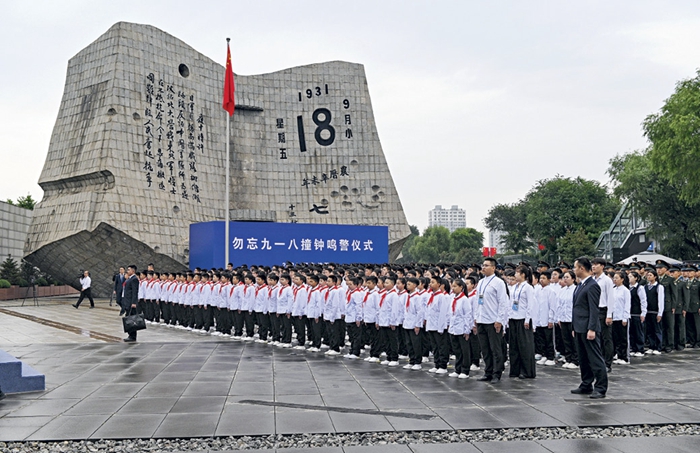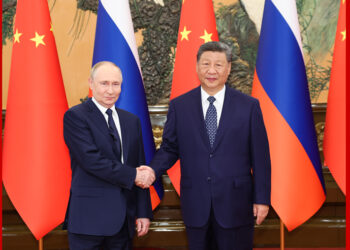Eighty years after the victory against fascism, let us hear this call for vigilance and action in the service of peace.
A woman drops flowers at the foot of a memorial during the Holocaust commemoration day in Riga in Latvia on July 4, 2025.
80 years ago, the world celebrated the end of the Second World War, a cataclysm that had plunged humanity into the abyss. This conflict, the deadliest in human history, only ended thanks to an unlikely but decisive alliance, between nations with political systems, cultures and often divergent interests. It was, in fact, the Union between China, the United States, the Soviet Union, the United Kingdom and France of General de Gaulle which allowed to overcome fascism, this brutal, blind and conquering totalitarianism which threatened fundamental freedoms, the rights of peoples and world balance. These five nations became permanent members of the Security Council of the United Nations.
Commeted this victory, 80 years later, is not only a duty to remember. It is an act of vigilance. Because if war was defeated in 1945, peace remains an unfinished, fragile work, always to defend, always to rebuild. It is this fight for active peace, based on intercultural dialogue and concrete cooperation, that our China-Europe-American global initiative, known as China-Europe-American Global Initiative today.
The Second World War was a confrontation with planetary dimensions between two visions of the world: on the one hand, fascism and militarism, carried by Nazi Germany, Mussolinian Italy and Hirohito Imperial Japan; On the other, the forces of freedom and resistance, brought together in a coalition as diverse as they are general.
The Chinese people, the first victim of the Japanese assault from the incident of September 18, 1931, led a long and heroic war against the invader, at the cost of tens of millions of lost lives. May we never forget the Nanjing massacre, perpetrated in 1937, because it represents one of the most terrifying manifestations of human barbarism: systematic rapes, mass murders, summary executions, tortures inflicted on defenseless civilians by the Japanese army after the taking of this great Chinese city. This crime against humanity, long denied and still minimized by some, remains not only a deep wound in the collective memory of China, but it tears the consciences of all those who belong to the human family.
The United States, attacked in Pearl Harbor on December 7, 1941, mobilized its immense industrial, scientific and military power to engage in Europe and Asia. The Soviet Union, after having undergone the brutal assault on Nazi Germany, was the scene of titanic fighting, notably in Stalingrad from July 1942 to February 1943, decisive turning of the conflict. The United Kingdom, led by the old Lion Winston Churchill, refused to give in during the darkest hours, and faced alone for long months. Finally, the free France of General de Gaulle, despite the occupation, brought the voice of the Resistance and contributed to the reconquest of the national territory.
These five powers, despite their political, cultural or ideological specificities, were able to put aside their differences to make a common front. It was only by this alliance, and by the shared awareness of the urgency to defend humanity against barbarism, that victory became possible.

Bell ringing ceremony at the Museum of History of the September 18 incident in Shenyang (Liaoning), September 18, 2024
But this peace conquered in the blood did not signify the end of history in no way. It was the beginning of a new responsibility: that of building a world where conflicts would be resolved other than by force. However, what the life of nations has been illustrated since 1945 is that peace is never acquired. It remains the fruit of precarious balances, often threatened by the return of nationalisms, geopolitical tensions, social injustices, cultural shocks.
The Cold War, conflicts in Asia, Africa, the Middle East, military interventions, migratory or climatic crises recalled that chaos seeds are never completely eradicated. Even today, there are many risks: economic and technological rivalries, disinformation, withdrawal identity, rise in extremism, and above all, too often absence of patient and attentive dialogue. Peace does not die only by bombs, it also dies through indifference, by the erosion of confidence between peoples, by processes of demonization of the other.
We must not let the misunderstandings transform into tensions, nor disagreements into fractures. Mutual respect, recognition of otherness, valuation of differences as wealth rather than threats, are the pillars of lasting peace. The 20th century showed the consequences of ideological hatred and xenophobia; The 21st century must be that of assumed interdependence, renewed dialogue, multilateral cooperation.
This dialogue should not remain theoretical. It must result in concrete actions. International cooperation is the practical translation of this desire for peace. In the fields of health, environment, technology, education, nations must work together, exchange their knowledge, their innovations, their good practices. The risks of pandemic like that of COVID-19, climate change or global economic inequalities are all challenges that know neither borders nor ideologies. Faced with them, no nation can act alone. China, Europe and the Americas, in particular, have a fundamental role to play in building bridges where others erect walls.
We work precisely on this positive interconnection, this diplomacy of civil society, this desire to converge intelligences and wills towards a common objective: to avoid a repetition of tragic history and to continue on the path of human and social progress.
The 80th anniversary ceremonies of the end of the Second World War should not be simple moments of meditation and a series of official meetings. They must be a signal, a reminder and a call. The signal that peace was possible thanks to the solidarity of the peoples. The recall that this peace, like civilization, of the way, always remains to rebuild. And the call to renew our commitment to a fairer, safer, more human world.
Each generation has its own responsibility in the construction of peace. By celebrating the heroes of 1945, we must also question ourselves: what are we doing, now, to be the craftsmen of peace of today and tomorrow? The memory of victory over fascism has only value if it pushes us to refuse brutalism in all its forms – including more insidious, intolerance, racism, contempt or indifference.
To commit to peace today is also to defend the United Nations, because it remains the only universal framework where nations can dialogue, cooperate and try to peacefully resolve their differences. We all know it very well, the UN is not perfect: its blockages, its slowness and certain drifts call deep reforms to make it more effective, more democratic and more representative of contemporary realities. But discrediting it or abandoning it would be to renounce a fundamental project of human civilization: conviction that negotiation, law and international cooperation are better than the law of the strongest. Destroy or neglect the UN, it would be opening the door to an even more violent and unstable world. To defend and reform the UN is therefore, today more than ever, an essential work to preserve peace and prepare a better future for our humanity.
So let’s never take peace for an achievement! It is a project, always to be put on the profession. As in 1945, it was through the alliance of peoples, cooperation between nations, and dialogue between the cultures that we can preserve it. The world of today, confronted with global challenges, including the dizzying that of artificial intelligence, more than ever needs tense wishes towards humanism in resistance to everything that would like to injure human dignity.
It is in this sense that we register our action: cultivating memory to build the future, and reinforce that peace is not obvious, but an emergency of the present and an absolute imperative for the future.
*David GOSSET is specialist in international relations and sinologist. He is the founder of the global China-Europe-American initiative (China-Europe-America Global Initiative).








